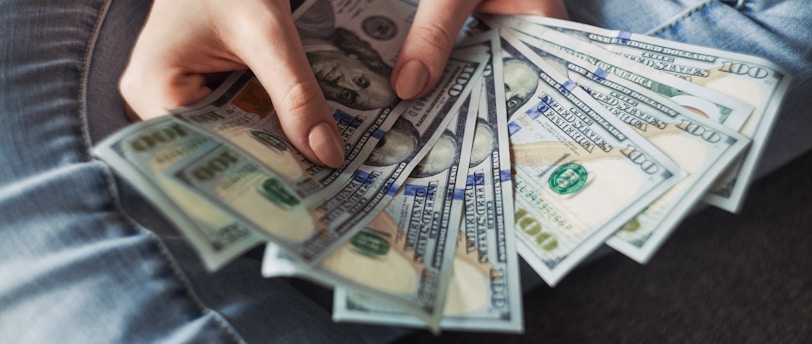
Smart Ways to Save for a Rainy Day
Discover practical strategies for building an emergency fund and preparing for unexpected expenses. These tips will help you establish financial security and be prepared for any financial challenges that come your way.
8/30/20234 min read


Saving money for rainy days is a wise financial practice that provides a safety net for unexpected expenses and emergencies. Here are some smart ways to save money for such situations:
Create a Budget: Establish a clear budget that outlines your income, expenses, and savings goals. Allocate a portion of your income specifically for your rainy day fund. We should always recommend setting a specific portion of your income to certain aspect of your expenses. A good rule of thumb is to have housing at a max of %33, food and groceries at %13, and maintenance bills and repairs at %13. With those other amenities out of the way, we would recommend at least saving %20 of your income for rainy days.
Set Clear Goals: Determine how much you want to save for your rainy day fund. Having a specific goal in mind will motivate you to consistently contribute. Depending on your situation rainy day funds may vary, but obviously you more you can save the better.
Automate Savings: Set up an automatic transfer from your checking to your rainy day savings account each time you receive your paycheck. This ensures that saving becomes a consistent habit.
Emergency Fund First: Prioritize building an emergency fund, which covers about 3 to 6 months' worth of living expenses. This fund acts as a financial cushion during unexpected job loss or emergencies. If you do not have the funds to cover such an event yet, you may be able to rely on unemployment benefits and other special programs for the time being, just don't make it a habit.
Cut Unnecessary Expenses: Review your spending habits and identify areas where you can cut back. Redirect the money you save into your rainy day fund. The usual culprits of this trap would be eating out, or attending events, although this habit can't be eliminated completely be sure to make a budget of what you can spend vs. what you can't.
Shop Smarter: Look for discounts, use coupons, and compare prices before making purchases. The money saved can be added to your savings. With other options such as cashback, the task becomes automatic when it comes to savings.
Reduce Debt: Pay off high-interest debts as quickly as possible. In my personal opinion, high-interest debt is considered anything above 10% due to the fact you will most likely not receive an interest rate higher than that if you were to invest the same amount. The money you were using to pay off debt can then be directed towards your rainy day fund.
Sell Unused Items: Declutter your home and sell items you no longer need. With online services such as Offerup and Craigslist, the process of decluttering is extremely fast depending on how much discounts you want to provide your possible buyers. The proceeds can go directly into your savings.
Limit Eating Out: Prepare meals at home and bring your lunch to work. Cooking at home is usually more cost-effective than dining out. The cheapest foods you can rely on are usually carbohydrate-based dishes, be sure not to rule out pasta or noodles for the biggest savings.
Side Hustle: Consider taking on a part-time job or side gig to earn extra income. With the availability of Uber and Fiverr, getting a part-time gig couldn't be easier. The additional money can be used to boost your savings.
Negotiate Bills: Contact service providers to negotiate better rates for your bills, such as cable, internet, and insurance. Especially with phone plans, just letting them know that you found a better deal will let service providers think twice about increasing your bill. Lower bills mean more money to save.
Avoid Impulse Buying: Practice mindful spending by waiting a day or two before making non-essential purchases. In most cases, you can go without a lot of things and still be happy in life. With the extra time, you can truly determine if you need the item or not.
Save Windfalls: When you receive unexpected money, like a tax refund, bonus, or gift, consider saving a significant portion of it. The key to not being impulsive in spending this cash is just believing that it didn't exist in the first place.
DIY Projects: Instead of paying for services like cleaning or repairs, consider doing these tasks yourself to save money. You will be surprised by how many "how to videos" there are on YouTube, Make use of these online resources to the fullest.
Energy Efficiency: Conserve energy by turning off lights, unplugging devices, and using energy-efficient appliances. With your highest bill usually coming from the air conditioner, feel free to turn it off when night strikes to save some cash. This can lower your utility bills immensely.
Stay Healthy: Invest in your health by adopting a healthy lifestyle. Exercising at least 30 minutes a day can actually reduce your cravings to overeat, as it will mentally and emotionally make you feel guilty, believe me, it works. Not only that it can reduce your grocery bills, your medical expenses will also stay at a manageable level in the long run.
Comparison Shop: Before making larger purchases, research and compare prices to ensure you're getting the best deal. With websites like CamelCamelCamel, and Honey, finding price drops and discounts couldn't be easier.

